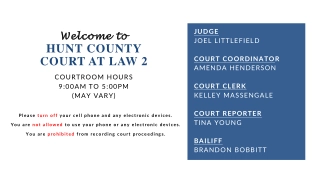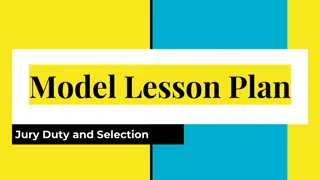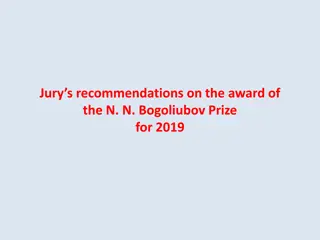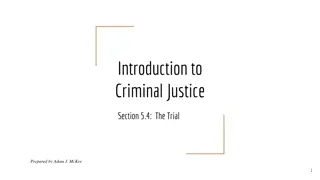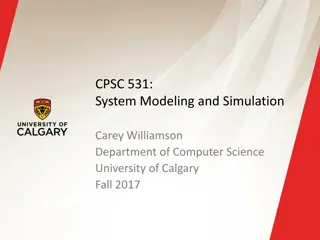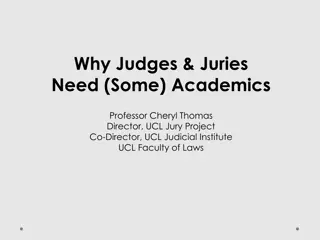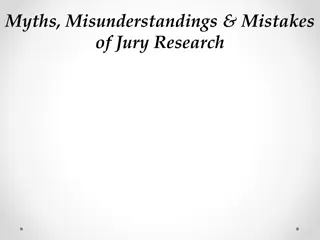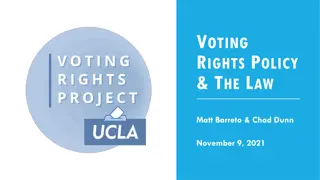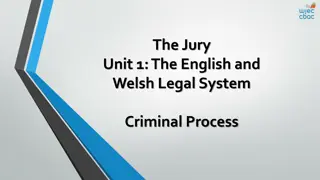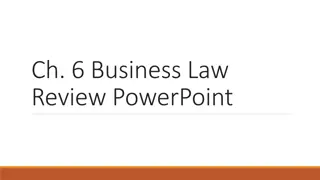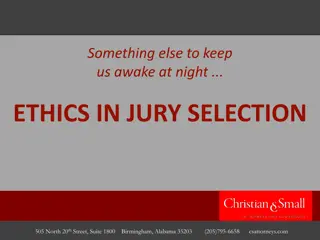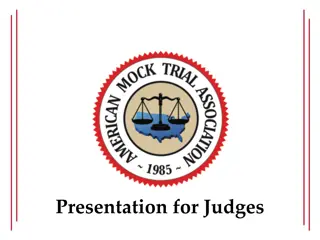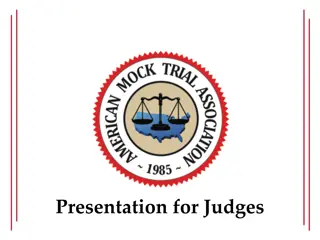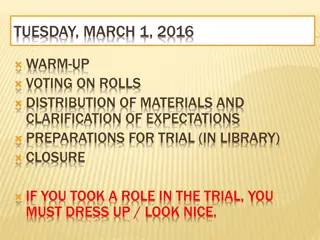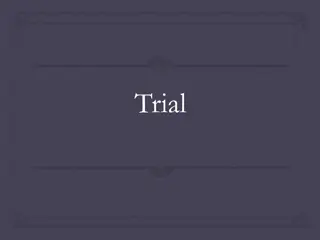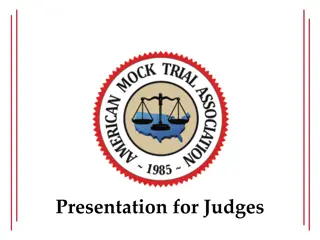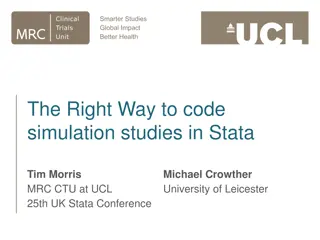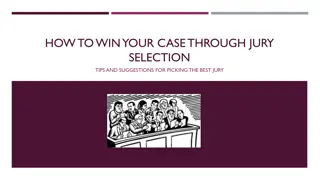Civil Jury Trial Simulation: Winter v. TBD, Inc.
Simulation competition where students portray attorneys and witnesses in a civil jury trial based on the case of professional writer Riley Winter suing an online magazine for wrongful termination due to age discrimination. Judges preside over the trial, score performances, and provide feedback, focusing on the presentation of evidence and arguments in a fictional setting with its own laws. Differences from real-world trials include specific rules for witness selection and trial structure.
Download Presentation

Please find below an Image/Link to download the presentation.
The content on the website is provided AS IS for your information and personal use only. It may not be sold, licensed, or shared on other websites without obtaining consent from the author.If you encounter any issues during the download, it is possible that the publisher has removed the file from their server.
You are allowed to download the files provided on this website for personal or commercial use, subject to the condition that they are used lawfully. All files are the property of their respective owners.
The content on the website is provided AS IS for your information and personal use only. It may not be sold, licensed, or shared on other websites without obtaining consent from the author.
E N D
Presentation Transcript
What is this Competition? Simulation of a civil jury trial Students portray attorneys and witnesses Fictitious jurisdiction of Midlands Midlands has its own case law Midlands has its own statutes Midlands has its own rules of evidence (that closely mirror the FREs)
This Years Case: Winter v. TBD, Inc. Summary: Professional writer Riley Winter, age 50 at the time of termination, has sued an online magazine, TBD, Inc., for wrongful termination on the basis of age discrimination. All claims other than the one based on age discrimination have been foreclosed. If you have heard this case before, be aware that you may see a very different round this time because: You may see a liability only trial or a trial where evidence of both liability and damages will be presented Witness selection varies from round to round The witnesses selected by the teams will result in different availability of documentation and time to perform their parts. Do not score on these strategic choices, only on performance of what was actually presented.
What is your role? You are here to judge the competition. You will do so in panels of two or more individuals. Judges fill three roles: Preside over the trial (one person per round) Score the trial (two people per round) Provide feedback (everyone) Reach a verdict
Your Role: Presiding Over the Trial One judge will preside over the trial and act as judge in the courtroom ruling on objections and keeping the trial moving. Trial consists of: Pre-Trial Matters (including introductions) Opening statements Plaintiff case-in-chief (three witnesses) Customary break Defense case-in-chief (three witnesses) Customary break Closing Arguments (including rebuttal)
Your Role: Presiding Over the Trial Differences from Real-World trials: Both teams must: Present opening statements at the start of trial Call three witnesses Cross-examine all witnesses called There are: NO objections to openings or closings NO motions in limine, for a directed verdict, or mistrial NO side bars NO objections or questions from the judges NO scope limitations on cross-examination (but scope is limited on re- direct and re-cross examination) NO requirements that expert witnesses be tendered NO binding federal precedents (e.g. McDonnell Douglas Corp. v Green does not control the burden of proof), though there is Midlands case law that the competitors will inform you of if necessary.
Your Role: Scoring the Trial Two judges will score the trial using this blue (carbon paper) ballot.
Your Role: Scoring the Trial Left = plaintiff/prosecution Right = defense Score 1-10 10 is high score Use whole numbers (fractions/decimals will be disregarded)
Your Role: Scoring the Trial Score on the blue ballot as the trial proceeds. Please do not wait until the end of the round to decide on scores. Score on your own. Please do not collaborate with other judges on scores.
Your Role: Scoring the Trial Score differences between teams. Scale doesn t matter, just be internally consistent. Point differential is what matters.
Your Role: Scoring the Trial There are SEPARATE scores for: Opening statements Direct examinations Cross examinations Closing arguments Witnesses on direct and cross. There are NO SEPARATE scores for: Pre-trial matters Re-direct examinations Re-cross examinations Rebuttal Objection arguments.
Your Role: Scoring the Trial At the end of the round, please rank the top four attorneys and witnesses from the round.
Your Role: Scoring the Trial Differences from other competitions: Witnesses are scored On both direct-examination and cross-examination Witnesses are allowed to costume Attorneys and witnesses are allowed to use demonstrative aids (subject to objection)
Your Role: Scoring the Trial Differences from other competitions: This competition has NO invention of fact objection, but the rules do allow for impeachment if there is an invention of fact. Teams may NOT invent a material fact on direct- examination such inventions are subject to impeachment. If you believe a successful impeachment has occurred, you should reflect that in your score by penalizing the the violating team, rewarding the impeaching team, or both.
Your Role: Commenting All scoring judges should receive FOUR comment sheets (more carbon paper): Students will fill out their names, roles, and team code.
Your Role: Commenting There are blanks to write comments on all parts. Non-shaded boxes are for plaintiff or prosecution parts. Shaded boxes are for defense parts.
Your Role: Commenting Students will get copies of written comments. After the trial is complete, please provide a few minutes of verbal feedback as well.
Roles of Others: Students Students act as competitors in the trial. Students school identity should remain anonymous until after the round. Note that all trials are public. Do not assume the identity of the teams based on who enters the courtroom. Students act as timekeepers. The trial has a three-hour time limit and each part of the trial has time limits. The students will keep you informed of time limits. Please enforce time limits when you are informed of them.
Roles of Others: AMTA Representatives AMTA Representatives ensure that all rules are followed. AMTA Representatives may enter the courtroom to inform you of time limit issues, please follow their instructions. AMTA Representatives may enter the courtroom to resolve a conflict brought to their attention by students, please follow their instructions.
Summarizing: The Big Things to Take Away Presiding: Let students argue, but listen to any time limitations students bring to your attention. Scoring: Score on performance, not merits of the case. Score as the trial proceeds, not at the end of the round. Fill in all blanks on blue score sheet legibly. Commenting: Students will get copies of all written comments. Provide verbal feedback, but keep it to 10 minutes or less for the entire judging panel combined.
What happens next? You will be assigned to a judging panel. Each panel will be at least two people. You will be assigned to a room. If you have already judged a team in that room at this tournament, then please do not begin the trial and let us know of the potential conflict. If you are somehow affiliated with a team in that room (e.g. your child is on the team), then please do not begin the trial and let us know of the potential conflict.








